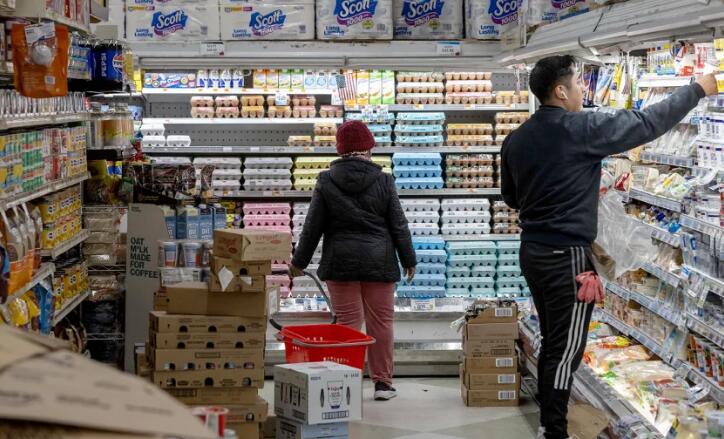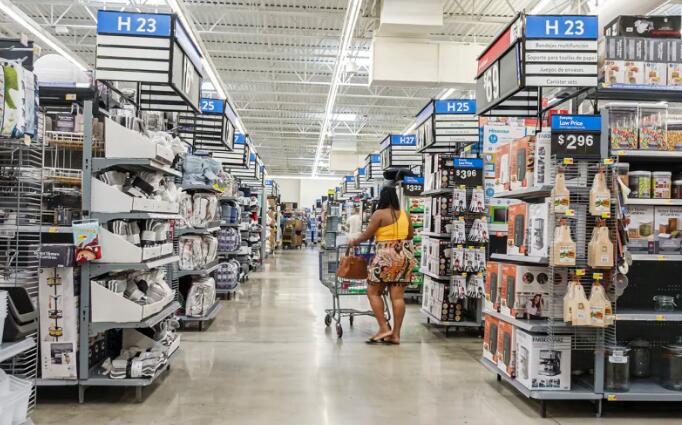Excerpt: A weaker-than-expected retail sales report adds to growing concerns about a slowing US economy, as consumers pull back spending amid inflation and trade uncertainty.

A troubling signal has emerged from the US retail sector, as spending at retailers came in significantly weaker than expected last month, suggesting that the American shopper might be reaching their spending limits.
According to the Commerce Department, retail sales rose by a mere 0.2% in February compared to the previous month, a figure far below the 0.7% increase projected by economists in a FactSet poll. This modest gain follows a revised 1.2% decline in January. These figures are adjusted for seasonal variations but do not account for inflation.
President Donald Trump’s volatile trade policies with key trading partners have created a climate of uncertainty among consumers and businesses alike. This apprehension is evident in various consumer surveys, and now, shoppers appear to be modifying their spending habits accordingly. Retail sales constitute approximately one-third of total spending in the US.
The weak consumer spending data are amplifying anxieties about a potential slowdown or even a recession in the US economy. The latest retail report did little to quell these concerns.

The most significant spending declines were observed at department stores (-1.7%), restaurants and bars (-1.5%), and gasoline stations (-1%). Conversely, sales experienced growth online and at health stores, rising by 2.4% and 1.7%, respectively.
However, the report wasn’t entirely bleak. Excluding sales at gas stations, car dealerships, building materials stores, and restaurants – often referred to as the “control group” – retail spending saw a 1% increase in February on a monthly basis, fully recovering from the 1% drop in January. This positive data point surpassed economists’ expectations of a 0.4% gain.
“With sentiment so poor, investors have been hoping the mighty US consumer provides reassurance that all is well on Main Street,” commented Jonathan Moyes, head of investment research at Wealth Club. “They didn’t find it, with retail sales coming in lower than expected the US consumer is starting to look a little peaky.”
Retailers Sound the Alarm
Executives at major US retail chains have recently voiced concerns about consumers feeling financially strained and becoming more cautious with their spending. Some retailers have indicated that they may need to raise prices if the ongoing trade war escalates.
“Our customers continue to report that their financial situation has worsened over the last year as they have been negatively impacted by ongoing inflation,” noted Todd Vasos, chief executive of Dollar General, during a recent earnings call. “Many of our customers report they only have enough money for basic essentials, with some noting that they have had to sacrifice even on the necessities.”
Walmart, the largest retailer in the US, also anticipates a slowdown in sales and profit growth this year. The company’s finance chief, John David Rainey, cited “uncertainties related to consumer behavior and global economic and geopolitical conditions” during an earnings call last month.
In addition to discussing the health of the US consumer, retail executives have also weighed in on the potential impact of Trump’s tariffs on their operations.
“We’ve never seen this kind of breadth of tariffs. This, of course, impacts the whole industry,” said Best Buy CEO Corie Barry on a call with analysts. The company anticipates that its vendors will pass on some of the tariff costs to retailers, “making price increases for American consumers highly likely.”
Earlier this month, Trump imposed a 25% tariff on Mexico and Canada – later delaying the tariffs after complaints from business leaders. That same day, Target CEO Brian Cornell told CNBC that Trump’s tariffs could swiftly lead to higher prices for fruits and vegetables imported from Mexico, adding that the uncertainty surrounding the tariffs could also negatively impact the company’s profits.
The Fed and Conflicting Signals
The US economy is facing a complex situation, with declining consumer confidence, sluggish retail sales, and a lukewarm housing market. Adding to the mix is the threat of higher inflation due to Trump’s tariffs.